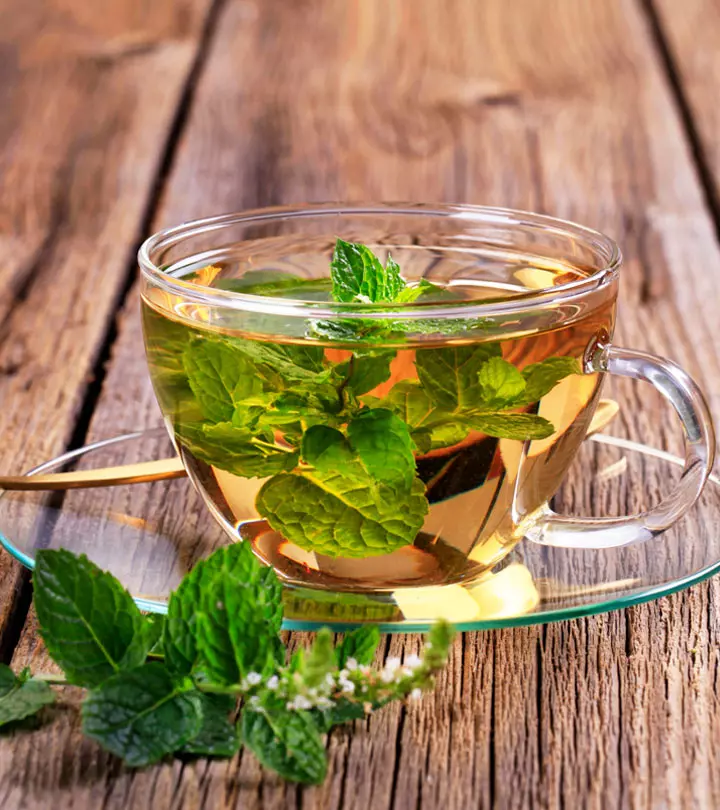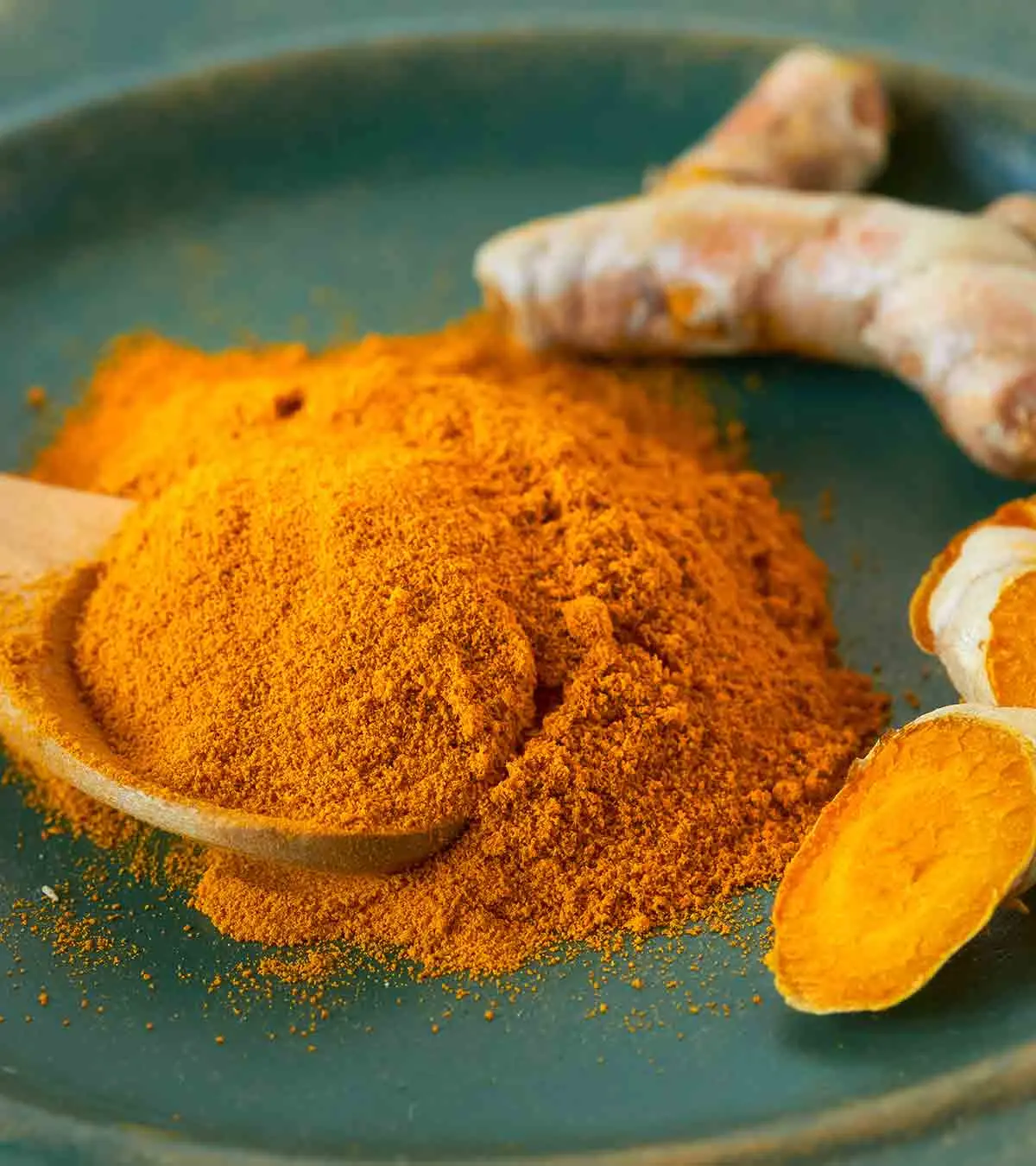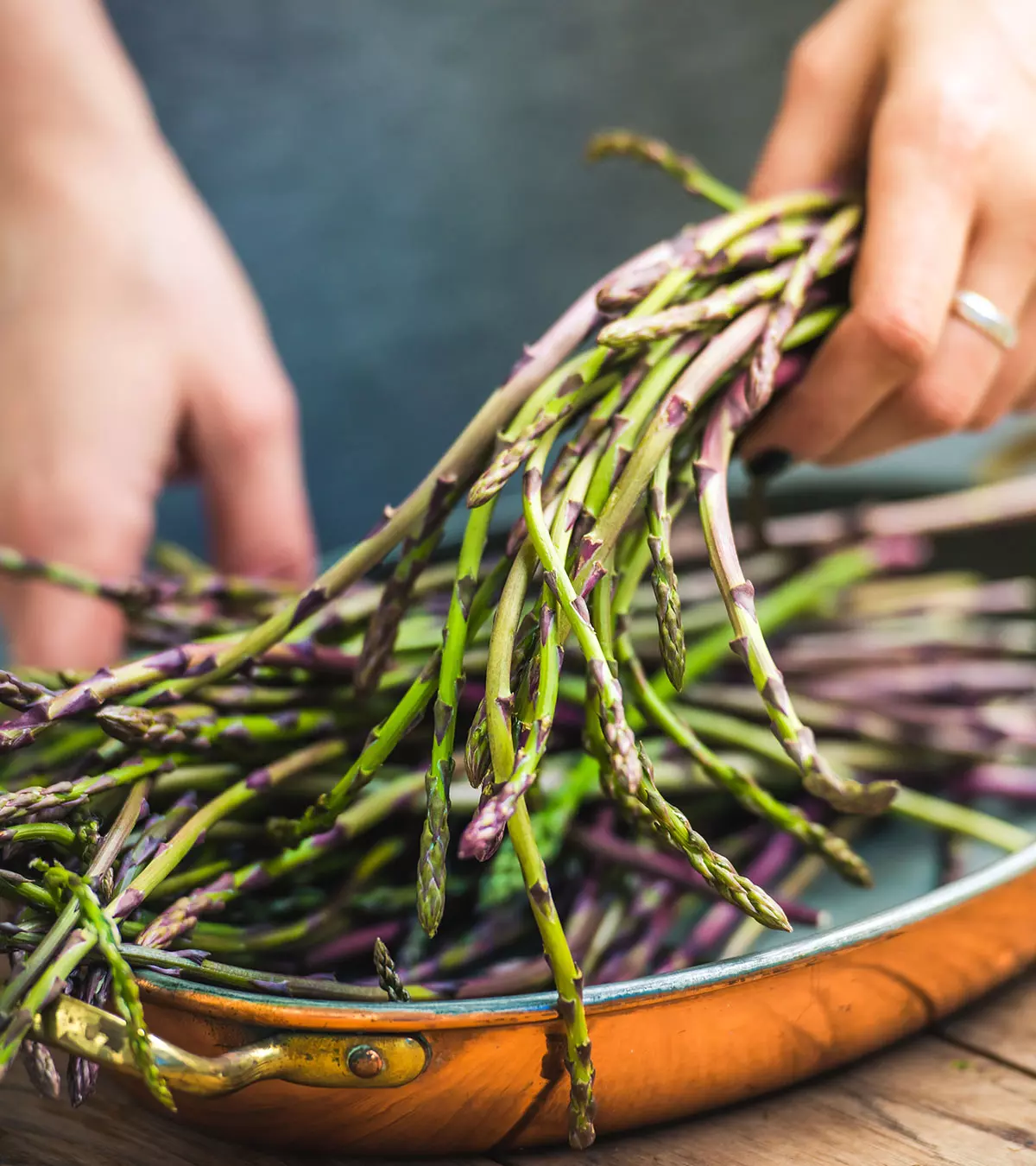
Image: Shutterstock
Asparagus is a nutritious and versatile spring vegetable that can be consumed either boiled, grilled, roasted, steamed, or sauteed.
While it has gained a lot of popularity in the past few years as a wholesome and weight-loss vegetable, many new mothers may wonder if it is safe to eat asparagus while breastfeeding. Read this post to know if eating asparagus can make you and your baby gassy or not, and some interesting and delicious asparagus recipes.
Key Pointers
- Asparagus has a subtle flavor and is a highly nutritious spring vegetable.
- Women can safely consume asparagus while breastfeeding, but they must be careful as it may cause allergies.
- It is recommended to avoid using asparagus in its medicinal capacity while breastfeeding.
- Overconsumption of asparagus by mothers can cause digestive issues and gas production in breastfed babies.
Nutritional Value Of Asparagus
Asparagus is a healthy, low-calorie vegetable that aids the secretion of the hormone prolactin, stimulating milk production in breastfeeding mothers (5). Every 100-gram portion of boiled asparagus contains the following nutrients (7).
| NUTRIENT | AMOUNT |
| Energy | 22 kcal |
| Carbohydrate | 4.11 g |
| Protein | 2.4 g |
| Fiber | 2 g |
| Fat | 0.22 g |
| Potassium | 224 mg |
| Calcium | 23 mg |
| Sodium | 14 mg |
| Magnesium | 14 mg |
| Iron | 0.91 mg |
| Zinc | 0.6 mg |
| Vitamin C | 7.7 mg |
| Vitamin E | 1.5 mg |
| Vitamin B3 | 1.08 mg |
Source: U.S. Department of Agriculture
Is It Safe To Eat Asparagus While Breastfeeding?

You checked with your doctor about what to eat and avoid eating while pregnant. Similarly, now that you are breastfeeding your baby, you must check the safety of anything you eat or drink. It is because, in most cases, what you eat or drink now will directly affect your baby’s health and nutrition through breast milk. It is always best to check with your doctor before consuming anything that could cause a possible reaction in your little one.
It is safe to eat asparagus while you are breastfeeding because of its rich nutrition profile, including protein, calcium, potassium, fiber, folate, iron, and vitamin K, A, and C. It is also a good source of omega-3 and omega-6 fatty acids. However, it’s important to know that asparagus is also sometimes used in a medicinal capacity. It is highly unsafe to use asparagus in its medicinal capacity while nursing.
Some people are allergic to asparagus. If you are allergic to leeks or onions, chances are you are also allergic to asparagus. If you have never eaten asparagus and want to include in your maternal diet, it may be a good idea to wait until after you wean your baby.
 Quick tip
Quick tipCan Eating Asparagus Make You Gassy While You Are Breastfeeding?

Certain foods can cause gas and make you feel bloated and heavy after eating them. If you are breastfeeding, your baby may also develop gas from these foods. In severe cases, this excess gas may cause colic.
Asparagus contains a type of carbohydrate known as raffinose and other carbohydrates, including glucose, fructose, and galactose. Babies’ intestines do not have the enzyme that helps break down raffinose. As a result, your baby’s digestion can be affected when you eat asparagus. Thus, we recommend consuming asparagus in moderation while breastfeeding to minimize gas for you and your baby and to check your infant’s reaction after feeding.
Quick And Easy Asparagus Recipes
Here are a few healthy recipes for breastfeeding moms that you can try:
1. Simple Asparagus Recipe
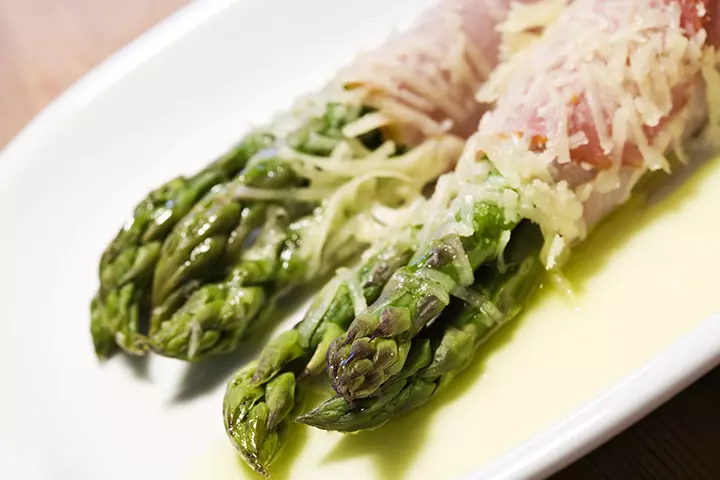
You Will Need:
- 2 tbsp. olive oil
- Some fresh asparagus
- 3 tbsp. lemon juice
- Salt and pepper to taste
- ¼th cup finely grated cheese
How To:
- Heat the oil in a skillet and cook the asparagus for about five minutes or till it starts to turn tender.
- Add the lemon juice and sprinkle with salt and pepper as per taste.
- Once done, place the asparagus on the serving dish and add cheese on top.
2. Sesame Asparagus
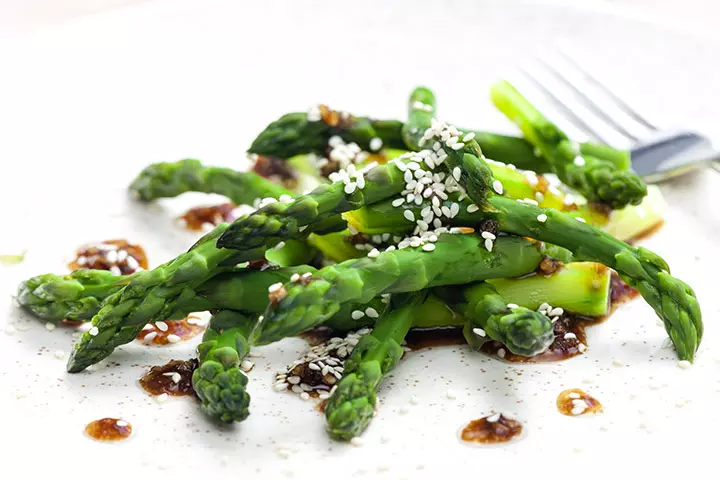
You Will Need:
- A bunch of asparaguses
- 2 tbsp. rice vinegar
- 1 ½ tsp soy sauce
- 1 ½ tbsp. sesame oil
- 1 tsp sesame seeds
How To:
- Boil the asparagus and transfer on a platter once they are tender.
- Mix the vinegar, soy sauce and oil in a bowl. Dress up the asparagus with the sauce and sprinkle with sesame seeds.
3. Asparagus Puree Soup
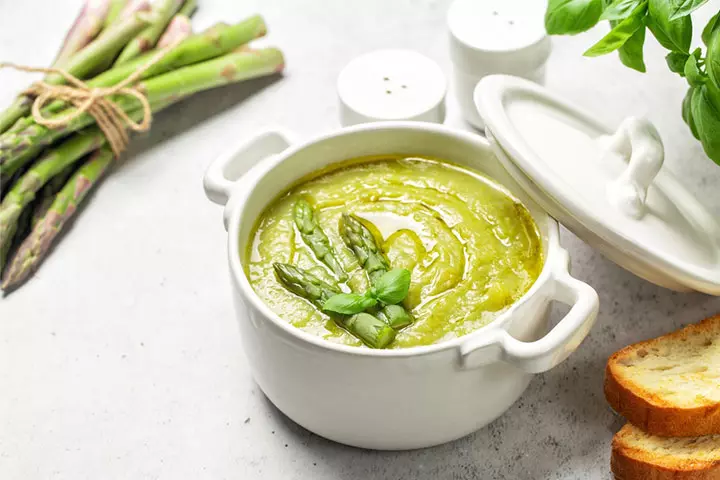
You Will Need:
- For the broth:
- 1 medium onion, chopped
- 4 garlic cloves, halved
- Green of 1 large leek (optional)
- Salt to taste
- ¼ tsp freshly ground pepper
- Trimmed stems from 1 pound asparagus, cut in 1-inch lengths
- 2 quarts water
For the soup:
- 1tbsp extra virgin olive oil
- 1 leek, white and light green parts only, sliced and cleaned optional
- 1 medium onion, chopped
- 2 garlic cloves, peeled and halved
- 2 medium-sized russet potatoes, peeled and diced
- Salt, preferably kosher salt, to taste
- 1½ quarts asparagus broth (above)
- A bouquet garni made with a bay leaf and a few sprigs each parsley and thyme
- 1 pound asparagus, woody ends snapped off, sliced about 1 inch thick, plus 12 whole stalks, woody ends snapped off, for the garnish
- 2 tsp fresh lemon juice
- Freshly ground pepper
- Chopped fresh tarragon for garnish
How To:
- Combine all of the ingredients for the broth and bring them to a boil. Simmer on low flame for 30 minutes and then strain.
- In another large, heavy soup pot, heat oil over medium heat, and add the leek, onion, and salt. Cook gently for five minutes, stirring often, until the onion and leek have softened.
- Add the garlic, stir together for a minute, then add the potatoes, broth, bouquet garni, and salt to taste. Bring to a boil, reduce the heat, cover, and simmer for 30 minutes. Add the chopped asparagus (not the 12 spears), and simmer for 10 minutes. Remove from the heat, and remove the bouquet garni.
- Puree the soup with a hand blender. Add the lemon juice and salt and pepper to taste.
- Meanwhile, steam the 12 asparagus spears for four minutes, until just tender. Refresh with cold water, then slice about ¾inch thick.
- Ladle the soup into bowls, garnish each serving with a handful of sliced asparagus, sprinkle with tarragon and serve.
 Quick tip
Quick tipFrequently Asked Questions
1. Does asparagus detox your body while nursing?
There is no scientific study that links detoxification and asparagus for nursing mothers. Nevertheless, some researchers consider asparagus to be a part of a balanced diet for lactating mothers (2). On the other hand, some studies also say that you should avoid asparagus when you are breastfeeding (3). There is no conclusive answer to this, so consult your doctor beforehand if you are nursing.
2. When nursing, is it healthier to consume asparagus raw or cooked?
It is emphasized that fruits and vegetables should be cooked before eating rather than being ingested in their raw state (4). If you are nursing, it is better if you eat cooked asparagus. If you wish to consume it raw, consult your doctor first.
3. Does asparagus help in milk production?
Asparagus has phytoestrogens, fiber, folic acid, vitamins A, C, and K, as well as tryptophan, which promotes the production of prolactin hormone, necessary for milk formation (5).
4. Can asparagus cause allergies in breastfeeding infants?
Asparagus allergies in infants are rarely reported. However, the strong taste of asparagus may alter the flavor of breast milk, making the baby averse to breastfeeding.
It is safe to consume moderate amounts of asparagus while breastfeeding. However, you may avoid using larger quantities of asparagus for medicinal purposes. Raffinose, a type of carb found in asparagus, can cause gasses in breastfed babies when it passes to breastmilk in higher quantities since the baby’s digestive system cannot digest it properly. So breastfed mothers should limit consumption of asparagus in lower labels. You may add sesame asparagus and simple soared asparagus recipes to your diet, and consuming it based on a breastfeeding schedule can prevent its ingredients from reaching the baby. However, to avoid risks, research on the foods to avoid while breastfeeding and consult your doctor to ensure the safety of your baby.
Infographic: Delectable Asparagus Recipes For Breastfeeding Mothers
Asparagus is a delicious and healthy vegetable that is safe for lactating mothers. You can make different simple to elaborate dishes and have asparagus during breastfeeding. So, scroll through the infographic below as we present tasty and healthy asparagus recipes you can prepare and enjoy during breastfeeding.
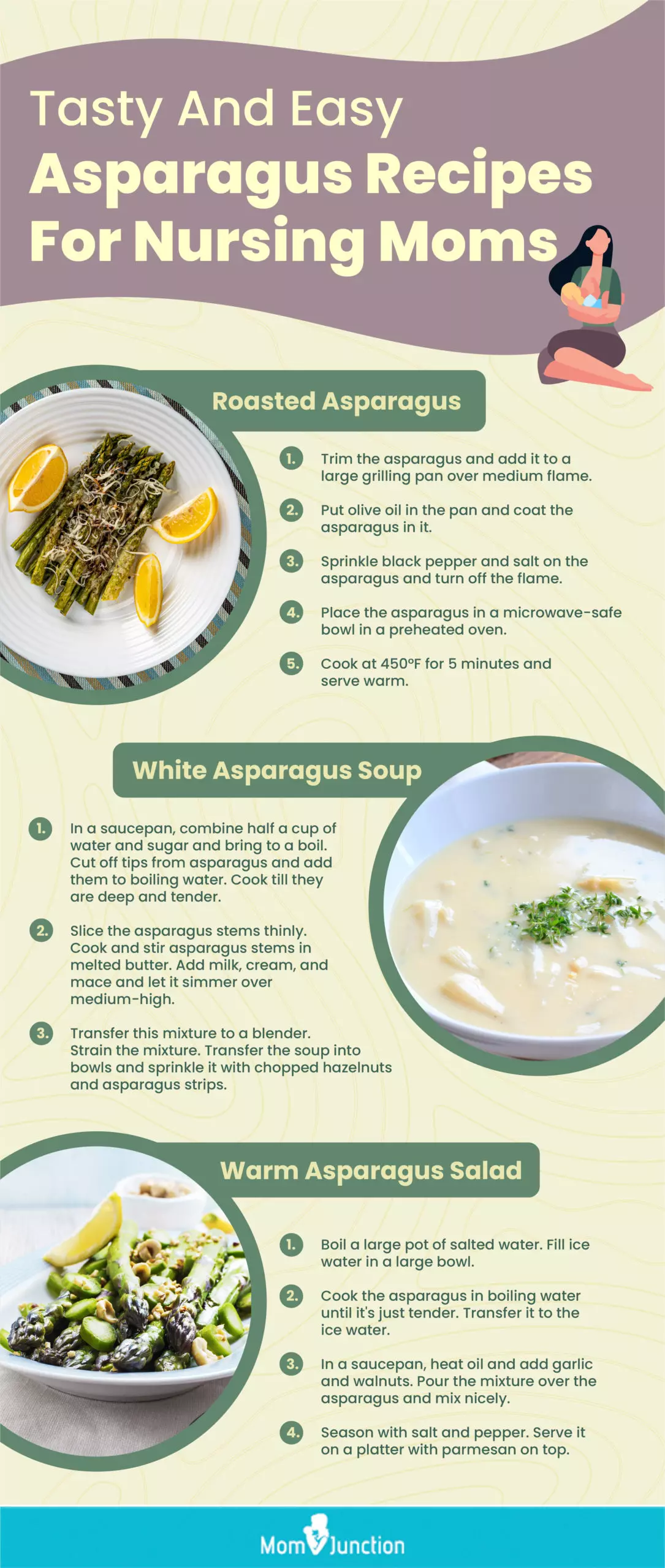
Illustration: Momjunction Design Team
Do you wish to include asparagus in your food? Learn about the amazing health benefits of asparagus and how it can help aid your overall health with our video.
Illustration: Is It Safe To Eat Asparagus While Breastfeeding?

Image: Dall·E/MomJunction Design Team
References
- J. S. Negi et al.; (2010); Chemical constituents of Asparagus.
https://www.ncbi.nlm.nih.gov/pmc/articles/PMC3249924 - What is a Healthy Breastfeeding Diet? From Gluten and Dairy Free to MSPI
https://www.amazonka.org/what-is-a-healthy-breastfeeding-diet-from-gluten-and-dairy-free-to-mspic6eb.html?hsLang=en - Adverse effects of herbs as galactogogues
https://australianprescriber.tg.org.au/articles/adverse-effects-of-herbs-as-galactogogues.html - Health Benefits of Fruits and Vegetables
https://www.ncbi.nlm.nih.gov/pmc/articles/PMC3649719/ - Foods that promote lactation
https://jamaicahospital.org/newsletter/foods-that-promote-lactation/ - Asparagus.
http://archive.acoe.org/wellness/FamilyNews/asparagus.pdf - Asparagus, cooked, boiled, drained.
https://fdc.nal.usda.gov/food-details/168390/nutrients
Community Experiences
Join the conversation and become a part of our nurturing community! Share your stories, experiences, and insights to connect with fellow parents.
Read full bio of Dr. Jessica Madden
Read full bio of Jessica Albert
Read full bio of Swati Patwal
Read full bio of Shinta Liz Sunny









